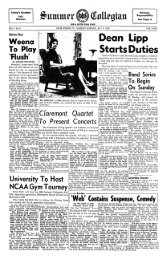9 - Digitized Collections
9 - Digitized Collections
9 - Digitized Collections
Create successful ePaper yourself
Turn your PDF publications into a flip-book with our unique Google optimized e-Paper software.
The Daily Collegian<br />
Tuesday, March 25, 1986<br />
Medical ethics:<br />
Probing whether to 'pull the plug or sustain life with technological advances<br />
By CHRISTINE KILGORE<br />
Collegian Science Writer<br />
"Ten years ago, my brother was hit by a<br />
car and went into a coma for about a month.<br />
Then he recovered (but that was) after the<br />
doctors said he had no brain waves. At that<br />
time, there was never any question (about<br />
removing him from the respirator). But, £/<br />
there had been, my parents never would have<br />
given up."<br />
his life-and-death situation, faced by a<br />
University student and her family,<br />
T exemplifies one of the most debatable<br />
bioethical issues in today's society: who<br />
should be maintained by medical technology?<br />
In an age of rapidly-growing medical technology,<br />
bioethical questions concerning pulling<br />
the plug on comatose patients like the<br />
young man described above, and an array of<br />
other dilemmas face doctors and society.<br />
The sky-rocketing costs of medical care,<br />
the allocation of resources, the role of state<br />
and federal governments, and the question of<br />
who should make life and death decisions, are<br />
some of the issues that have quickly come to<br />
the forefront.<br />
Sheldon R. Gelman, professor of social<br />
work and director of the Social Work Program<br />
at the University, said many students<br />
will confront bioethical issues sometimes in<br />
their lives.<br />
"Young people — and college students —<br />
tend to think they're immortal and invincible,"<br />
said Gelman. "But what happens if<br />
they're involved in an accident? Do they want<br />
to be hooked to machines? Do they want to be<br />
subject to new technology? Those kinds of<br />
things have to be thought about beforehand."<br />
Gelman pointed to the landmark case of<br />
Karen Ann Quinlan, who in 1975 lasped into a<br />
coma at the age of 21 after taking a combination<br />
of tranquilizers and alcohol. After laying<br />
comatose in a New Jersey hospital for ten<br />
years, she died last year, ending the case that<br />
sparked interest in bioethical decision-making.<br />
"That's probably the first case that got as<br />
widespread publicity, because it involved an<br />
attempt by her parents to make a decision to<br />
forego the use of the respirator to prolong the<br />
life of their daughter," Gelman said. "The<br />
unusual thing about Karen Ann Quinlan was<br />
that once the respirator was removed under<br />
court order, she continued to live, and live,<br />
and live."<br />
"There were many others like her who<br />
remained in a vegetative state with no real<br />
likelihood of ever coming back to possess<br />
those human qualities other people possess,"<br />
he said.<br />
o<br />
4BH||^HBnKaUjg^* © ,979 V0LK<br />
•<br />
• • ••<br />
9 A<br />
Dilemmas with technology<br />
Gelman said the Quinlan case, and the<br />
whole argument of bioethics, is related, in<br />
part, to "the expanded technology and the<br />
ability to prolong or maintain life almost<br />
indefinately."<br />
'(The Karen Ann Quinlan case is) probably the first case that<br />
got as widespread publicity, because it involved an attempt<br />
by her parents to make a decision to forego the use of the<br />
respirator to prolong the life of their daughter. The unusual<br />
thing about Karen Ann Quinlan was that once the respirator<br />
was removed under court order, she continued to live, and<br />
live, and live.'<br />
Sheldon R. Gelman, professor of social work and director of the<br />
University's Social Work Program<br />
Leonard J. Waks, University professor of<br />
science, technology and society, agreed that<br />
advancing technology is driving many of<br />
today's bioethical dilemmas.<br />
"It's a slow and changing evolution.<br />
Through all technology, there are unanticipated<br />
risks," Waks said. "Technology is<br />
going to, over time, have effects we can't<br />
assess."<br />
Robert A. Walker, professor of science,<br />
technonogy and society-health education,<br />
said the United States is presently in a stage<br />
of "half-way technology," where health-care<br />
is constantly being improved for the next<br />
generation.<br />
"We're in an adolescent period," Walker<br />
said.<br />
"Clearly, it is the role of the human being to<br />
take the risks associated with technological<br />
development," he said.<br />
Technology advances cause skyrocketing<br />
health care costs. This raises the question of<br />
who will receive expensive medical care,<br />
Gelman said.<br />
j;<br />
I<br />
"Someone eventually has to pay for (technology's)<br />
application," he said.<br />
Such long-term implications of medical<br />
technology are now being addressed with the<br />
artificial heart, as some critics claim the<br />
risks and costs are too high. Others say the<br />
heart is worth it.<br />
Danner Clouser, humanities professor at<br />
the University's Hershey Medical Center,<br />
said the main bioethical dilemma surrounding<br />
the artificial heart involves the cost and<br />
consequently, the allocation of resources.<br />
These resources, he explained, are limited<br />
public funds.<br />
"The question is, who should get (the<br />
artificial heart)? Of course, this dilemma is<br />
true of any new technology," Clouser said.<br />
Using the artificial heart "is just so incredibly<br />
expensive," he said. "I've been told that<br />
for the first artificial heart transplant, we<br />
could have given free pap tests to all the<br />
women in the country. This would have saved<br />
many lives."<br />
However, Gelman said artificial organs is<br />
just one of the issues linked to economics.<br />
"With limited funds, should we prolong the<br />
lives of severly handicapped children or an<br />
elderly person with minimal brain function,<br />
or should we reallocate these resources?"<br />
Gelman said.<br />
Waks said to find an answer, people must<br />
look at each situation and ask whether there<br />
is any value in prolonging life.<br />
"We have to look at the quality of life,"<br />
Waks said. "If a person is paralyzed and<br />
isolated and can't go on living the life they<br />
carved out for themselves, there's a serious<br />
question."<br />
"I don't have shallow views on life ... and<br />
I'm all for health care of the elderly," Waks<br />
explained. "I'm not talking about interventions<br />
that are useful — many are. What I'm<br />
not for is the death-extending process."<br />
One should ask whether respirators and<br />
other "life-sustaining" medical treatments<br />
are prolonging life or extending death, he<br />
said.<br />
o<br />
© 1979 VOLK<br />
The struggle for solutions<br />
Waks is one of many professors, physicians,<br />
clergy members, and families who are<br />
struggling for answers.<br />
According to a March 17 New York Times<br />
report, the American Medical Association<br />
recently ruled it is ethically appropriate for<br />
doctors to withhold "all means of life prolonging<br />
medical treatment" from patients in<br />
irreversible comas but not necessarily terminally<br />
ill.<br />
This policy, it was reported, will be of<br />
greatest concern to the estimated 10,000 people<br />
who are in irreversible comas in institutions<br />
throughout the country today.<br />
Gelman said the policy "may give courts<br />
some direction in terms of what the current<br />
medical thinking is," when they deal with<br />
life-and-death cases.<br />
"The courts don't have any medical expertise,"<br />
Gelman said, adding that they look for<br />
opinions among physicians.<br />
Gelman said although the United States has<br />
begun addressing bioethical issues, the costs<br />
and allocating resources is not "something<br />
we've formally dealt with in this country."<br />
"England, for example, has a policy that no<br />
one who develops kidney disese and is above<br />
the age of 55 can be provided access to kidney<br />
dialysis," he said. "People over 55 who can<br />
secure the costs themselves may certainly<br />
receive dialysis. We're talking about public<br />
funds, however."<br />
"It may seem like a coarse approach (to<br />
the federal government's) role, something<br />
we're not ready to deal with yet in this<br />
country," he said,<br />
"Bioethical dilemmas that have been faced<br />
for years were always handled by small<br />
numbers of people without much public scru-<br />
'(The study of ethics) can't be reduced to a formula. In the<br />
medical community, doctors have to penetrate to the heart<br />
of the lives before them. An ethics problem can't become<br />
like a physics problem.'<br />
—Leonard J. Waks, University professor of science, technology and<br />
society<br />
tiny as to either the process or the outcome,"<br />
Gelman said.<br />
"Today people are thinking about these<br />
things," he added.<br />
He pointed to the well publicized cases of<br />
Elizabeth Bouvia, the quadriplegic who<br />
asked for medical assistance in starving<br />
herself to death; Baby Fae, an infant who<br />
received a baboon s heart, and Baby Doe, a<br />
severely handicapped Indiana infant who<br />
was denied medical treatment by the parents<br />
and state courts.<br />
Just as the medical community is recognizing<br />
and dealing with biomedical ethics, the<br />
general public is becoming more aware of the<br />
bioethical dilemmas faced today, Gelman<br />
said.<br />
"Most people would prefer not to be aware,<br />
however. It's very difficult for any individual<br />
to make a decision that involves whether or<br />
not somebody lives or dies," he said.<br />
But Gelman explained there are no simple<br />
answers.<br />
Each day physicians, families and courts<br />
learn what may be the best ethical choice for<br />
one patient may be the worst for another.<br />
This is why bioethical decisions must be<br />
made on a case-by;case basis, remembering<br />
that life is a basic human right, he said.<br />
Gelman said exactly who makes life and<br />
death decisions is a leading issue. Some<br />
physicians are becoming more reluctant to<br />
make decisions that were traditionally theirs.<br />
"Some welcome the input of others, including<br />
the family," he said.<br />
Ethics committees form<br />
Gelman said one result of the Baby Doe<br />
case was a recommendation that hospitals<br />
develop intricate review, or ethics, committees<br />
to provide counsel and advice.<br />
"The notion of ethics committees has<br />
grown rather dramatically in the last three or<br />
four years," Gelman said. "They deliberate<br />
very difficult, tragic choice decisions."<br />
Gelman is one of about a dozen members of<br />
a recently established ethics committee at<br />
Centre Community Hospital, which includes<br />
health care professionals, social workers,<br />
and clergy members.<br />
"The group should serve as an adviser and<br />
consultant in difficult situations in which a<br />
physician or other health care provider really<br />
is torn between the directions they can go —<br />
between treating and not treating, between<br />
resuscitating and not resuscitating," Gelman<br />
said<br />
Jack Branigan, executive director of<br />
Centre Community Hospital, emphasizes that<br />
the committee is "strictly an advisory<br />
board."<br />
Brannigan said the non-medical perspective<br />
of the committee is extremely important.<br />
"The committee is a recognition on the part<br />
of our medical community that there is a<br />
need to consider ethical issues associated<br />
with life and death," he said.<br />
A similar ethics committee has been established<br />
at Hershey in response to new regulations<br />
following the Baby Doe case.<br />
Clouser said this group — the Infant Care<br />
Review Committee — meets to review cases<br />
when physicians are considering whether to<br />
withdraw life support.<br />
In response to the growing importance of<br />
bioethical decision-making, many medical<br />
schools are beginning to offer and even require<br />
courses in medical ethics, Gelman said.<br />
"Eventually, that kind of course will be an<br />
integral part of the medical education curriculum.<br />
There are courses now in ethics for<br />
nurses, engineers, and business people," he<br />
said. "What it does is inform people that the<br />
decisions that people in various professions<br />
make have implications for the broader society."<br />
Waks said, however, that the study of<br />
ethics, "can't be reduced to a formula."<br />
"In the medical community, doctors have<br />
to penetrate to the heart of the lives before<br />
them," he said. "An ethics problem can't<br />
become like a physics problem."<br />
"Ethics — if it's of any life — comes from<br />
compassion, not from logic," Waks said.<br />
"And this compassion comes from experience."<br />
"What might be more valuable (than an<br />
ethics course) would be to confine doctors to<br />
a hospital room," Waks said. "It would be<br />
like a criminology student going to jail for a<br />
day."<br />
Coleen Rickabaugh (freshmen-pre-medical)<br />
is pleased that an ethics course may be a<br />
required part of her future medical curriculum.<br />
"You can form opinions on your own, but<br />
you should be presented with options," she<br />
said.<br />
Gelman said, "Those who have made (life<br />
and death) decisions have made them after<br />
what they believe to be very careful consideration."<br />
Gelman reiterated that no matter what an<br />
individual decides, it has to be made on a<br />
case-by-case basis, with no set rules or regulations<br />
to follow.<br />
"They've got to be careful that they're not<br />
absolutely sure that they did the right thing,<br />
because the minute you're absolutely sure<br />
about anything, it makes it very easy the next<br />
time to reach the decision," he explained. "If<br />
it comes easy, you can lose sight of the<br />
individual case you're dealing with and start<br />
to fit people into categories — there always<br />
has to be a question."<br />
"You should always take the process very<br />
seriously, without any quick or snap judgements."
















